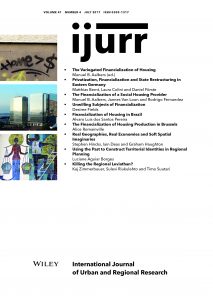This article seeks to advance debates about the financialization of housing by focusing on the emergence of rental housing as a frontier for financialization, a dynamic that is increasingly relevant since the global financial crisis. Situated in New York City, the research focuses on an aggressive wave of investment in affordable rent-stabilized properties by private equity firms, their efforts to release value from these properties, and the implications of the 2008 financial crisis for their investment strategies and thus for tenants’ experience of home. Through detailed empirical analysis tracing the connections between how rental housing has been constituted as a new site for private equity investment globally, the local conditions facilitating this process in New York and how it reshaped everyday life for tenants, the article theorizes tenants as unwilling subjects of financialization. Yet unwillingness does not necessarily translate into being overtaken; it also connotes reluctance and indeed struggle. This novel conceptualization highlights the ways in which financialization meets with dissent, and its necessarily contingent and incomplete nature. The article therefore develops the wider intellectual project of understanding financialization not as a monolithic and inevitable process, but as one characterized by resistance from without and contradiction from within.

